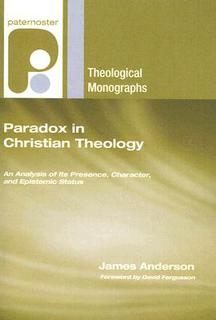Paradox in Christian Theology
 Paradox in Christian Theology is a revision of my doctoral thesis published in the Paternoster Theological Monographs series by Paternoster in the UK and by Wipf & Stock in the US. To my great surprise (and delight) it has garnered more interest than it deserves. This page is an attempt to gather in one place the various references to the book I’ve come across.
Paradox in Christian Theology is a revision of my doctoral thesis published in the Paternoster Theological Monographs series by Paternoster in the UK and by Wipf & Stock in the US. To my great surprise (and delight) it has garnered more interest than it deserves. This page is an attempt to gather in one place the various references to the book I’ve come across.
It has been reviewed by Steven Boyer in Religious Studies 44:2 (2008), Paul Brazier in The Heythrop Journal 49:2 (2008), Dale Tuggy in Faith and Philosophy 26:1 (2009), and Victoria Harrison in The Journal of Theological Studies 61:1 (2010). Gary Crampton wrote a highly critical review for The Trinity Review; I’ve written a lengthy response.
 Tuggy followed up his review with a critical article on my proposal: “On Positive Mysterianism,” International Journal for Philosophy of Religion 69:3 (2011). (You can read a preprint here.) My response, “On the Rationality of Positive Mysterianism,” was published in International Journal for Philosophy of Religion 83:3 (2018).
Tuggy followed up his review with a critical article on my proposal: “On Positive Mysterianism,” International Journal for Philosophy of Religion 69:3 (2011). (You can read a preprint here.) My response, “On the Rationality of Positive Mysterianism,” was published in International Journal for Philosophy of Religion 83:3 (2018).
The book has also been discussed in a few corners of the blogosphere and I’ve posted some comments in response. Paul Manata posted a detailed review on Triablogue (comments are here), which accurately summarizes the book’s argument. Paul Helm has written a short review. It gets a mention by Andrew from the group blog City of God (here) and a review by Nick Norelli on Rightly Dividing the Word of Truth (here and here).
Despite my best efforts at proofreading, a number of typos crept into the first printing. However, I know for a fact that Wipf & Stock are now printing the corrected version.
You can read here the abstract and table of contents from the thesis on which it is based.
What’s Your Worldview?
What’s Your Worldview? is a little book of applied apologetics published by Crossway. It’s designed to help readers understand what a worldview is, why it matters, what their own worldview is, and why some worldviews are superior to others. Here’s the publisher’s description:
How Do You View the World?
It’s a big question. And how you answer is one of the most important things about you.
Not sure what you’d say? Join James Anderson on an interactive journey of discovery aimed at helping you understand and evaluate the options when it comes to identifying your worldview. Cast in the mold of a classic “Choose Your Own Adventure” story, What’s Your Worldview? will guide you toward finding intellectually satisfying answers to life’s biggest questions—equipping you to think carefully about not only what you believe but why you believe it and how it impacts the rest of your life.
You can find some reviews on Amazon and on Goodreads. Crossway has also produced a 30-page sampler and a study guide for discussion groups.
Why Should I Believe Christianity?
Why Should I Believe Christianity? is an introductory exposition and defense of the biblical Christian worldview, published by Christian Focus Publications in a new series entitled The Big Ten: Critical Questions Answered. The book takes an explicitly worldview-based approach, with some additional features that distinguish it from other works in Christian apologetics. Here’s the publisher’s blurb:
Some people boldly claim, “Christianity is fine for some, but it isn’t for me”. Others feel it is just outdated and irrelevant. For better or worse, everyone in the Western world has come into contact with Christianity: we all have some opinion on it. James Anderson, with a clear, humorous logic, explores what Christianity really claims, and shows the underlying reason and consistency behind these claims. By the end of Why Should I Believe Christianity?, while you may not agree with the Christian worldview, it is impossible to be left sitting on the fence.
You can find a summary of the book here. Some helpful reviews:
- Review by Kristi Mair for bethinking.org
- Review by Henry Smith for Associates for Biblical Research
- Review by Digby James for Evangelical Times
David Hume (Great Thinkers)
David Hume is my contribution to P&R’s Great Thinkers series. Here’s the publisher’s blurb:
Through his pursuit of a naturalistic grounding for morality and his forceful critique of supernaturalism, Scottish philosopher David Hume significantly undermined confidence in orthodox Christianity.
Professor, minister, and philosopher James Anderson summarizes the major points of Hume’s thought and offers a critical assessment from a distinctively Reformed perspective. He shows that Hume’s arguments, far from refuting the Christian worldview, indirectly support that worldview by exposing the self-defeating implications of naturalism. Deepen your understanding of this immensely influential thinker, and you will be better able to engage with today’s secular challenges to faith.
You can read the foreword (by Andrew Hoffecker) and a sample chapter here, and another excerpt from the book can be found here. An interview with Reformed Forum on the philosophy of David Hume is available here.

